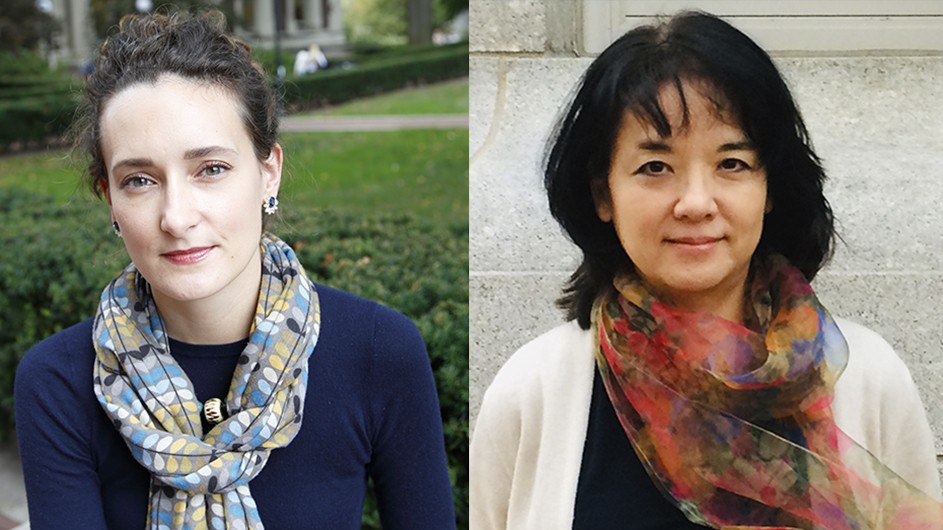Celebrating Women in Electronic Music at Columbia
The Unsung Stories project--a conference, a podcast, and a concert--explores the legacy of women composers, sound artists, and musicians who have worked at the Computer Music Center.

Unsung Stories: Women at Columbia's Computer Music Center focuses on the legacy of women who have studied and worked at the renowned Columbia-Princeton Electronic Music Center (renamed the Computer Music Center in 1996). The project includes three parts: a two-day symposium on April 9 and 10, 2021, a podcast series, and a concert during the 2021-2022 academic year.
Unsung Stories highlights the work, visibility, and diversity of women composers and musicians at the center since its founding in the early 1950s through today by examining the impact of academic and cultural institutions and attitudes about race, ethnicity, gender, sexuality, and other modes of identification. The conference will feature events with more than 30 composers, musicians, sound artists, and scholars.
The podcast includes five initial episodes about the stories of these women told through conversations with historical musicologists, music theorists, and composers. More interviews will be added to the archive in the future.
Zosha Di Castri and Ellie Hisama, the two music professors who produced both the conference and the podcast, discuss Unsung Stories with Columbia News.
Q. How did this project come about?
A. In the early months of the pandemic, we applied for funding for the podcast series, conceiving of it as a way to begin documenting the untold oral histories of these women in a widely accessible format. In addition to the series serving as an archive of women who have worked and composed at the Computer Music Center, we hope that the podcast will spark public interest in the affiliated symposium. It’s important for our current students to know about the lineage of women who have been active at the center since its beginning, and these two initiatives allow us to spotlight their important contributions to the field of electronic music.
Q. Does the podcast cover the experiences of both earlier generations of women at the center, as well as more recent composers and musicians?
A. The podcast documents the work of the first generation of women, including Alice Shields, who was at the Computer Music Center from 1964 to 1996, and Pril Smiley, who worked there from 1963 to 1995. We are also featuring the work of some of the women who were at the center more recently, such as Yvette Janine Jackson, Yuriko Hase Kojima, and Sondra Woodruff.
Q. Can you share any details about any of their stories?
A. Composer Pril Smiley worked at the center alongside the founders. She was one of four primary instructors in electronic music there, and as we’ve learned from musicologist Brigid Cohen’s forthcoming book, Musical Migration and Imperial New York, Smiley was also appointed a technician at the center in the mid-1960s. In addition, she served as acting director of the center in 1984, and as associate director from 1985 to 1995. She has written electronic music for theater, dance, film, and TV documentaries, and was the recipient of a Guggenheim Fellowship in 1975.
Q. How does the current climate at the Computer Music Center compare to the culture of its early days?
A. From the podcasts with Alice Shields and Pril Smiley, we learned that the center was an exciting hub of international talent, and that from this diversity came a wide range of individual musical styles. The center also had a strong sense of community, with people like Vladimir Ussachevsky actively encouraging women in professional and compositional roles.
Since electronic music was then in its infancy, engineers and musicians often collaborated to further develop the technology. This legacy of tinkering, as well as the welcoming of an international and aesthetically diverse body of artists, is still present at the center, through our students, faculty, and visiting artists, all of whom continue to make strange and wonderful sounds at the center’s studios in Prentis Hall on 125th Street.
We hope that the work of all these amazing women through the years at the Computer Music Center will encourage emerging composers, musicians, sound artists, engineers, and producers to enter these vibrant fields. As Barnard College graduate and Atlantic Records engineer and producer Ebonie Smith said, “Education is central to having more women in the field.”
The Unsung Stories project received a public outreach grant from the Center for Science and Society, an anti-racism seed grant from the Office of the Vice Provost for Faculty Advancement, and a Diversity Matters grant from the Arts & Sciences' Committee on Equity and Diversity.
Cosponsors include the Fritz Reiner Center for Contemporary Music, the Department of Music, the Institute for Research on Women, Gender, and Sexuality, the Computer Music Center, the Sound Art Program at School of the Arts, Heyman Center for the Humanities/Society of Fellows, and the Barnard Center for Research on Women.